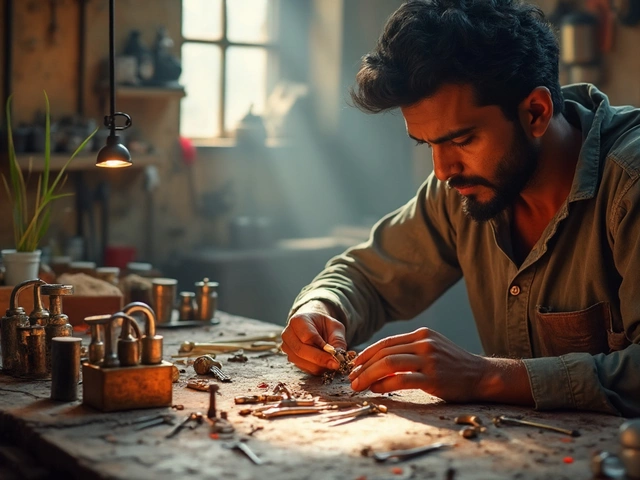Feeling stuck in deciding whether to pursue a diploma in India? Let's break it down. Diplomas are a great way to gain specific skills without the extensive commitment of a full-blown degree. They're typically shorter, more affordable, and laser-focused on practical knowledge. Whether you're looking to climb the career ladder, switch fields, or just sharpen your skills, a diploma might just be what you need.
In India, you'll find diploma courses that can have you job-ready much faster than a degree. Ever wondered why many people choose them? It’s often because they want to dive right into work without spending years in traditional academia. So, if hands-on learning is your style, a diploma might just fit the bill.
- Understanding Diplomas in India
- Advantages of Diploma Courses
- Diploma vs Degree: What’s the Difference?
- Popular Fields for Diploma Courses
- Making the Right Decision
Understanding Diplomas in India
If you’re considering a diploma course in India, it’s important to know what you’re getting into. Diplomas are educational qualifications that focus on practical and specific skills, usually in a particular industry. Unlike traditional degrees, they are mostly shorter in duration—commonly taking one to two years to complete.
Indian diploma courses cover a wide range of fields such as engineering, design, healthcare, and business. They're often offered by polytechnic institutes, private colleges, and some universities. The aim is straightforward: equip students with job-ready skills. This focus on practicality is why diplomas are ideal for those eager to dive into the job market quickly.
Diving deeper, diplomas tend to be popular among students who need a boost in career-specific areas without the long term academic commitment of degrees. For instance, in fields like engineering, a person might pursue a diploma in mechanical engineering to start working in factories or maintenance roles faster.
| Course | Duration | Common Jobs |
|---|---|---|
| Diploma in Computer Applications | 6 months to 1 year | Data Entry Operator, Computer Operator |
| Diploma in Fashion Designing | 1 to 2 years | Fashion Designer, Stylist |
| Diploma in Electrical Engineering | 2 to 3 years | Electrician, Maintenance Technician |
Besides the timeframe, the entry requirements are generally more relaxed compared to degree programs. Most diploma courses just need a completion of high school, making them accessible to many. So, if you’re eyeing quick entry into the workforce with specialized knowledge, diplomas in India can be an excellent starting point.
Advantages of Diploma Courses
Want to know why diploma courses in India are such a buzz right now? Well, these programs pack a punch when it comes to practicality and efficiency. They're designed to fit snugly into both busy schedules and tight budgets. Naturally, they have their charm, especially if you're not keen on long academic commitments.
Firstly, one of the biggest perks is the time factor. Diploma programs often take a year or two to complete, unlike degrees that can stretch out to three or four years. This means you start working and earning sooner. Who wouldn't want to get a jumpstart on their career?
Another win is the affordability aspect. With diploma courses, you typically spend less cash compared to traditional degrees. This makes it a smart choice if you're looking to minimize student debt and still gain valuable skills.
Plus, diplomas have this cool focus on practical skills. They often zero in on industry-specific training, which means you're not just hitting the books but also getting hands-on experience. For many fields, this practical knowledge is gold. Employers love candidates who can hit the ground running from day one.
And here’s something to keep in mind: in certain sectors like IT, design, and hospitality, a diploma is often equally valued as a degree. Sometimes, what employers want most is proficiency and competence, rather than a piece of paper.
| Field | Average Course Duration | Potential Starting Salary (INR/month) |
|---|---|---|
| IT and Computer Applications | 1 year | 30,000 - 50,000 |
| Culinary Arts | 6 months - 1 year | 20,000 - 40,000 |
| Fashion Design | 1 year | 25,000 - 45,000 |
So, if you're pondering over a diploma course, these advantages might just tip the scale for you. Quick entry into the workforce, savings, and practical skills make them pretty hard to ignore. Choose wisely!

Diploma vs Degree: What’s the Difference?
Choosing between a diploma course and a degree can feel like a big decision. Let's get into the nitty-gritty. The biggest perk of a diploma is its focus on practical skills. It usually takes 1-2 years to finish, which means you can quickly turn your knowledge into action. On the flip side, a degree offers a more in-depth academic journey, typically lasting three to four years.
So, why pick one over the other? If you're aiming for a specific job or industry, a diploma might be the ticket, especially in fields like hospitality, graphic design, or IT support. It's all about fast-tracking you to the workforce with real-world skills that employers love.
Degrees, however, usually cover a broader range of topics. They can open doors to a variety of careers but take more time and money. Think of degree holders as generalists with a deep understanding of theories that can lead to roles in research, management, or specialized positions.
The best choice really comes down to your goals. Are you looking to enter the job market quickly with clear, actionable skills? Or are you in for the long haul, aiming for roles that might require deeper academic knowledge?
If numbers speak to you, here's a basic comparison:
| Criteria | Diploma | Degree |
|---|---|---|
| Duration | 1-2 years | 3-4 years |
| Focus | Practical skills | Theoretical knowledge |
| Cost | Lower | Higher |
| Flexibility | Higher (part-time available) | Varied |
So when you're weighing your options, think about what works best for your career path and personal timeline. Neither path is better or worse—they're just different roads to reaching your goals.
Popular Fields for Diploma Courses
If you're wondering which fields offer the best diploma courses in India, you're in for a treat. Let's explore some of the crowd favorites that have been turning heads lately.
Information Technology (IT): With tech taking over the world, it’s no surprise that IT diploma courses have skyrocketed in popularity. These programs cover everything from software development to network management and can be a great entry into this thriving industry. Plus, you don’t need to spend years getting a degree; many courses wrap up in just a year or two.
Healthcare and Nursing: Want to make a difference with your career? Diplomas in healthcare, especially nursing, are in high demand. They typically offer hands-on training in patient care and healthcare management, setting you up for roles in hospitals and clinics. Given the global focus on health, skills in this area are very much needed.
Business Management: For those eyeing the corporate ladder, a diploma in business management can be a stepping stone to roles in sales, marketing, and administration. These courses cover essentials like leadership skills, project management, and strategic planning. If entrepreneurship is in your blood, this could be the way to go.
Fashion Designing: Have a flair for design? Diplomas in fashion aim to hone your creativity and technical skills, allowing you to enter the glamourous world of fashion. These programs often include textile design, fashion illustration, and even entrepreneurship, aiming to set you up as a future trendsetter.
Here's a quick snapshot of how some fields compare in terms of duration and average fees:
| Field | Duration | Average Fees |
|---|---|---|
| Information Technology | 1-2 years | INR 50,000-150,000 |
| Healthcare and Nursing | 1-3 years | INR 30,000-120,000 |
| Business Management | 1-2 years | INR 60,000-200,000 |
| Fashion Designing | 1-2 years | INR 80,000-250,000 |
These fields highlight the diverse options available and show that a diploma can be tailored to your specific career interests. Each path offers unique opportunities, so dive into what excites you the most!

Making the Right Decision
Choosing whether to invest your time and money in a diploma course in India can be a big decision. There are a few key points to consider that can help you make the most informed choice. After all, education is an important investment in your future.
First, evaluate the field you're interested in. Some industries place more value on diplomas than others. For example, if you're aiming to enter fields like fashion design, graphic design, or hospitality, diplomas are often highly respected and can lead directly to job opportunities.
Second, consider the cost-benefit factor. Diplomas generally cost less than degrees, both in terms of money and time commitment, but they also provide targeted skills that employers look for. Calculate the potential return on investment by comparing the costs with the potential salary increase or job opportunities in your chosen field.
To help with this decision-making process, here's a quick comparison of the average costs and potential earnings:
| Course Type | Average Cost (INR) | Average Starting Salary (INR) |
|---|---|---|
| Diploma | 20,000 - 1,00,000 | 2,50,000 - 4,00,000 |
| Bachelor's Degree | 2,00,000 - 5,00,000 | 3,00,000 - 5,00,000 |
Third, check the accreditation of the institution. Only go for diploma courses offered by recognized and reputed institutions to ensure that your qualification is respected by employers.
Last but not least, think about your career goals. If speed and practicality are your priorities, a diploma might be the right path. But if you're looking for a broader education and have more time and resources, a degree could be more beneficial in the long run.
At the end of the day, the right educational path varies for everyone. Evaluate your own goals, research, and choose the path that aligns best with where you see yourself in the future.





Write a comment